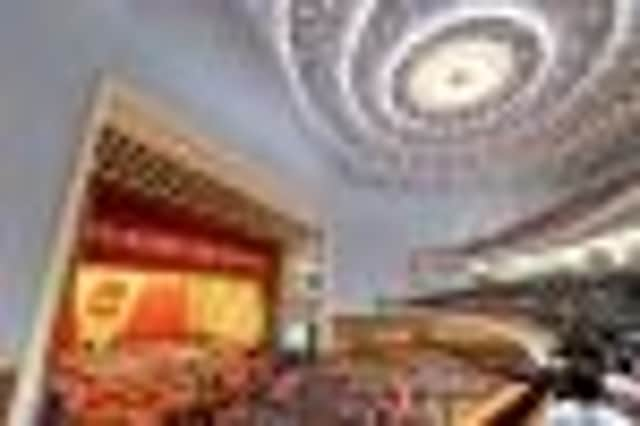Delegates vote 2,952 to one as Xi takes China’s top job


There was no white smoke over the Great Hall of the People in Beijing as Mr Xi was “elected” . Instead, just the usual thick layer of grey smog clung to the city’s skyline as the almost 3,000 delegates of the National People’s Congress cast their red ballots.
Mr Xi was elected by a vote of 2,952 to one, with three abstentions. It is not known who the lone dissenter was, but the result was unsurprising. The election of president and vice-president are, said state news agency Xinhua, “non-competitive”.
Advertisement
Hide AdAdvertisement
Hide AdThere was no emotional acceptance speech as the results were announced live on state television. Mr Xi merely bowed to delegates and shook hands with his predecessor, Hu Jintao.
Li Yuanchao was elected vice-president. Mr Xi is expected to remain in office for two five-year terms. Li Keqiang is expected to be appointed today as premier, replacing Wen Jiabao.
Last November, Mr Xi was named general secretary of the Communist Party and was also given leadership of the Central Military Commission, the top military body. The presidency gives him full power over the state, military and party.
His leadership style is more relaxed than that of his predecessor and he is seen as being more in touch with ordinary people. During a visit to the southern province of Guangdong last December, state media made much of the fact that Mr Xi went “tieless” and had a “casual chat” with the crowds who gathered in the city of Shenzhen.
“I think compared with Hu Jintao, Xi comes across as a person who is comfortable with power. He mixes quite well with the masses,” said Willy Lam, a politics expert at the Chinese University of Hong Kong.
But Mr Lam was quick to point out there will be no relaxing of the Communist Party’s hold on China. “In terms of policy, he is a conservative,” said Mr Lam. “Xi has made it clear there will be no political reform as it is understood in the West.”
In another indication of a differing leadership style, it has been reported that Mr Xi’s wife Peng Liyuan will be travelling with him on his first overseas visit as president to a meeting of the BRICS group of emerging economies in South Africa later this month. She is a famous folk singer in China.
Generally, the wives of Chinese leaders are rarely seen. However, Mr Xi’s wife “is a personality in her own right. Until about ten years ago, she was much more well known that Xi,” said Mr Lam.
Advertisement
Hide AdAdvertisement
Hide AdThe son of a veteran revolutionary, Mr Xi is a “princeling”, or member of the elite. He comes from a privileged background but emphasis is given to his Cultural Revolution experiences in a village in Shaanxi province where he worked on a farm. Mr Xi and his administration take over a country on target to become the world’s largest economy by 2030. But the new leaders are also facing many challenges, the biggest being the gap between rich and poor. China’s income inequality has rocketed in recent years, according to the Survey and Research Centre for Household Finance in China. But any improvements will be difficult, said Mr Lam, due to “the red aristocracy”.
“Those at the top of the party, including the Xi Jinping clan, monopolise a lot of resources. Reform will be difficult because it will cut into the interests of clans at the top of the party.”